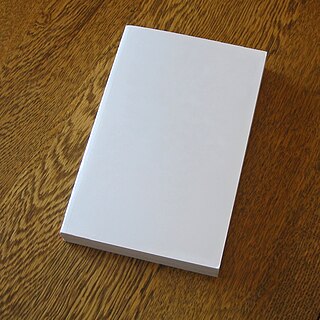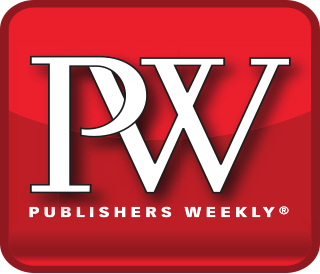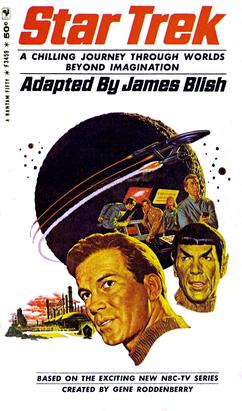Related Research Articles

Publishing is the activity of making information, literature, music, software, and other content available to the public for sale or for free. Traditionally, the term refers to the creation and distribution of printed works, such as books, comic books, newspapers, and magazines. With the advent of digital information systems, the scope has expanded to include digital publishing such as ebooks, digital magazines, websites, social media, music, and video game publishing.
Random House is an American book publisher and the largest general-interest paperback publisher in the world. It has several independently managed subsidiaries around the world. It is part of Penguin Random House, which is owned by the Germany-based media conglomerate Bertelsmann.

Print on demand (POD) is a printing technology and business process in which book copies are not printed until the company receives an order, allowing prints in single or small quantities. While other industries established the build-to-order business model, POD could only develop after the beginning of digital printing because it was not economical to print single copies using traditional printing technologies such as letterpress and offset printing.
Electronic publishing includes the digital publication of e-books, digital magazines, and the development of digital libraries and catalogues. It also includes the editing of books, journals, and magazines to be posted on a screen.

A paperback book is one with a thick paper or paperboard cover, and often held together with glue rather than stitches or staples. In contrast, hardcover (hardback) books are bound with cardboard covered with cloth, leather, paper, or plastic.
A vanity press or vanity publisher, sometimes also subsidy publisher, is a publishing house where the author pays to have the book published, and signs a restrictive contract which involves surrendering significant rights. It is not to be confused with hybrid publishing, or assisted self-publishing.

Scholastic Corporation is an American multinational publishing, education, and media company that publishes and distributes books, comics, and educational materials for schools, teachers, parents, children, and other educational institutions. Products are distributed via retail and online sales and through schools via reading clubs and book fairs. Clifford the Big Red Dog, a character created by Norman Bridwell in 1963, serves as Scholastic's official mascot.

Ballantine Books is a major American book publisher that is a subsidiary of German media conglomerate Bertelsmann. Ballantine was founded in 1952 by Ian Ballantine with his wife, Betty Ballantine. Ballantine was acquired by Random House in 1973, which in turn was acquired by Bertelsmann in 1998 and remains part of that company.
The bibliographical definition of an edition is all copies of a book printed from substantially the same setting of type, including all minor typographical variants.

Pocket Books is a division of Simon & Schuster that primarily publishes paperback books.

Publishers Weekly (PW) is an American weekly trade news magazine targeted at publishers, librarians, booksellers, and literary agents. Published continuously since 1872, it has carried the tagline, "The International News Magazine of Book Publishing and Bookselling". With 51 issues a year, the emphasis today is on book reviews.

Bantam Books is an American publishing house owned entirely by parent company Random House, a subsidiary of Penguin Random House; it is an imprint of the Random House Publishing Group. It was formed in 1945 by Walter B. Pitkin Jr., Sidney B. Kramer, and Ian and Betty Ballantine, with funding from Grosset & Dunlap and Curtis Publishing Company. It has since been purchased several times by companies including National General, Carl Lindner's American Financial and, most recently, Bertelsmann, which in 1986 purchased what had grown to become the Bantam Doubleday Dell publishing group. Bertelsmann purchased Random House in 1998, and in 1999 merged the Bantam and Dell imprints to become the Bantam Dell publishing imprint. In 2010, the Bantam Dell division was consolidated with Ballantine Books to form the Ballantine Bantam Dell group within Random House. By no later than February 2015, Bantam Books had re-emerged as a stand-alone imprint within Random House; as of 2023, it continues to publish as the Bantam imprint, again grouped in a renamed Ballantine division within Random House.

Johns Hopkins University Press is the publishing division of Johns Hopkins University. It was founded in 1878 and is the oldest continuously running university press in the United States. The press publishes books and journals, and operates other divisions including fulfillment and electronic databases. Its headquarters are in Charles Village section of Baltimore, Maryland.

Project MUSE, a non-profit collaboration between libraries and publishers, is an online database of peer-reviewed academic journals and electronic books. Project MUSE contains digital humanities and social science content from over 250 university presses and scholarly societies around the world. It is an aggregator of digital versions of academic journals, all of which are free of digital rights management (DRM). It operates as a third-party acquisition service like EBSCO, JSTOR, OverDrive, and ProQuest.

In 1966, Bantam Books acquired the license to publish tie-in fiction based on the science fiction television series Star Trek.
Self-publishing is the publication of media by its author at their own cost, without the involvement of a publisher. The term usually refers to written media, such as books and magazines, either as an ebook or as a physical copy using print on demand technology. It may also apply to albums, pamphlets, brochures, games, video content, artwork, and zines. Web fiction is also a major medium for self-publishing.

An ebook, also known as an e-book or eBook, is a book publication made available in electronic form, consisting of text, images, or both, readable on the flat-panel display of computers or other electronic devices. Although sometimes defined as "an electronic version of a printed book", some e-books exist without a printed equivalent. E-books can be read on dedicated e-reader devices, also on any computer device that features a controllable viewing screen, including desktop computers, laptops, tablets and smartphones.

Penguin Random House LLC is an American multinational conglomerate publishing company formed on July 1, 2013, with the merger of Penguin Group and Random House. Penguin Books was originally founded in 1935 and Random House was founded in 1927. It has more than 300 publishing imprints. Along with Simon & Schuster, Hachette, HarperCollins and Macmillan Publishers, Penguin Random House is considered one of the 'Big Five' English language publishers.

Atria Publishing Group is a general interest publisher and a division of Simon & Schuster. The publishing group launched as Atria Books in 2002. The Atria Publishing Group was later created internally at Simon & Schuster to house a number of imprints including Atria Books, Atria Trade Paperbacks, Atria Books Espanol, Atria Unbound, Washington Square Press, Emily Bestler Books, Atria/Beyond Words, Cash Money Content, Howard Books, Marble Arch Press, Strebor Books, 37 Ink, Keywords Press and Enliven Books. Atria is also known for creating innovative imprints and co-publishing deals with African-American writers as well as known for experimenting with digital or non-traditional print formats and authors.
A hybrid press is a publishing house which can be broadly defined by its source of revenue. The revenue source of a traditional publisher is through the sale of books that they publish, while the revenue of hybrid publishers comes from both book sales and fees charged to the author for the execution of their publishing services.
References
- 1 2 3 4 5 6 7 8 9 10 11 12 13 14 Freitag, Michael (1987-11-15). "On the Endangered List: The 'Instant Book'". The New York Times. ISSN 0362-4331 . Retrieved 2016-12-28.
- ↑ White, Jay (1999). "God's Ark: Subscription Book Publishing and the Titanic" (PDF). Acadiensis. XXVIII: 93–118.
- ↑ Rosenberg, Ronald (1983-11-25). "160-page 'Instant Book' on IBM's PCjr Home Computer Due Out Today". The Boston Globe.
- ↑ "Personnel Moves at Running Press". PublishersWeekly.com. Retrieved 2016-12-28.
As for the instant books, DeVito said that he'd like publishing to feel a little more urgency. "I definitely think that publishing has the ability to keep up with the electronic media. People force through an instant book now and then, but more often than not, the editorial and production staff try to keep people from doing that. We're at a stage now, with technology and smart management, where we can get out there very fast.
- 1 2 3 Gross, Jerry (July 1997). "St Martin's Press's Charles Spicer: 'Instant books must truly be worth it.'". Writer's Digest: 33 – via GALE Biography in Context.
- ↑ "A 'Seabiscuit' Stampede". PublishersWeekly.com. Retrieved 2016-12-28.
- ↑ "Triumph Scores With Stanley Cup Instant Book". PublishersWeekly.com. Retrieved 2016-12-28.
The book, which was produced with a 10,000-copy print run, documents in text and illustrations provided by the Los Angeles Times the number eight playoff seed's unlikely journey towards the first Stanley Cup championship.
- ↑ "This Week's Bestsellers: November 21, 2016". PublishersWeekly.com. Retrieved 2016-12-28.
- ↑ "JHU Press Publishes First Instant Book In Response to Gun Violence". PublishersWeekly.com. Retrieved 2016-12-28.
- 1 2 "Book Production Shifts Gears". PublishersWeekly.com. Retrieved 2016-12-28.
All over the industry, printing records are being broken. At Inland Press in Menomenee Falls, Wis., president Jim Lacy said the company prides itself on an under-15-day turnaround from receipt of purchase order to books shipped out. In the next few years, Lacy says, he is determined to get it down to 10 days. Ironically, the aspect of book publication that hasn't speeded up considerably is the sales and marketing cycle. On a normal schedule, the sales people still need to present a book to the marketplace five to six months before the on-sale date. On an exceptional basis, with an instant book, everything goes much faster.
- ↑ "<titanic>". jaywhite.ca. Retrieved 2016-12-30.